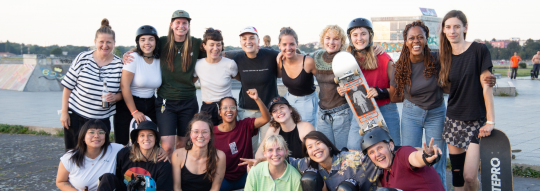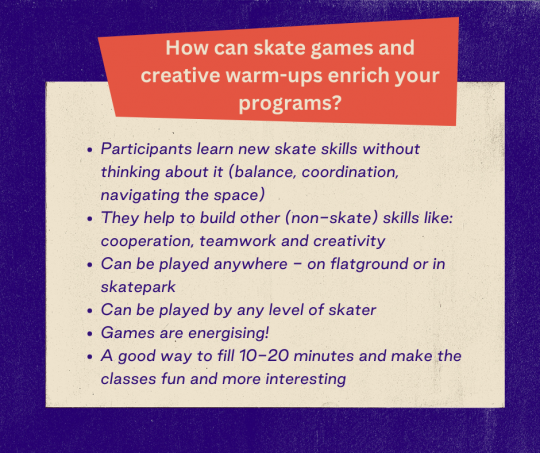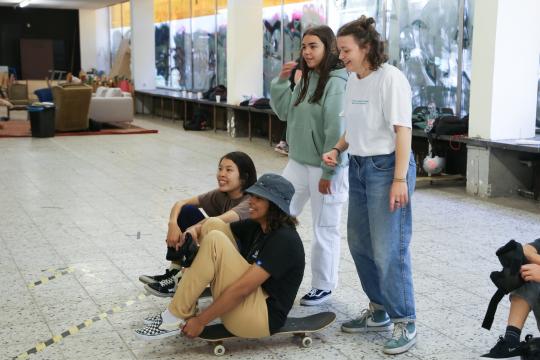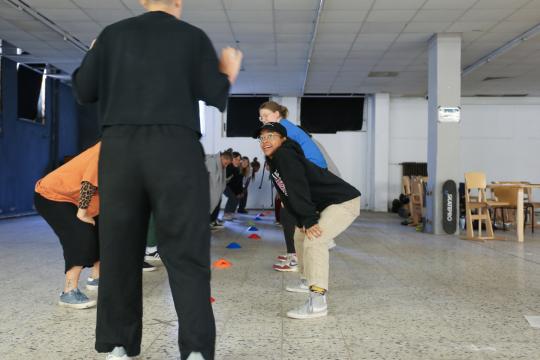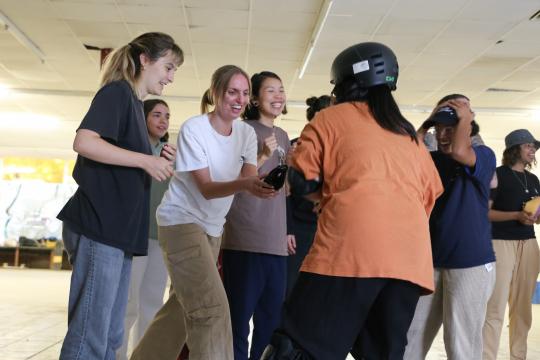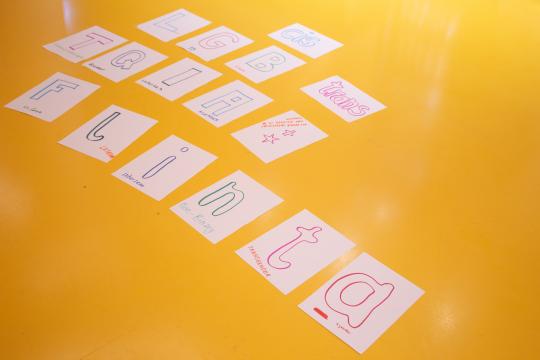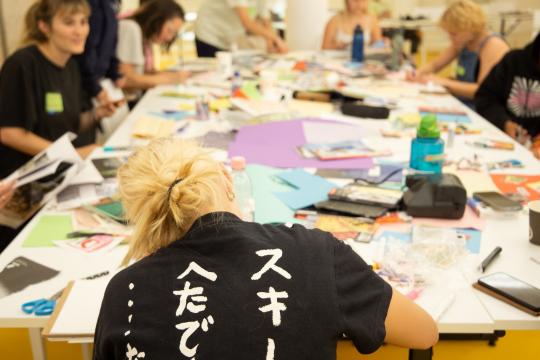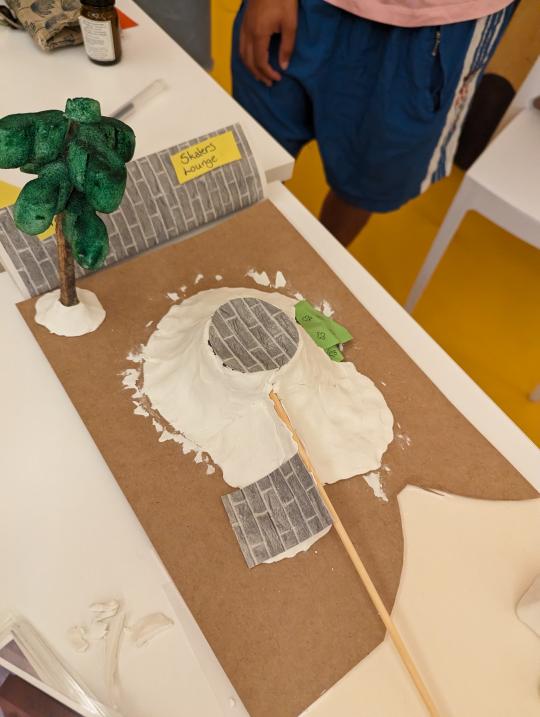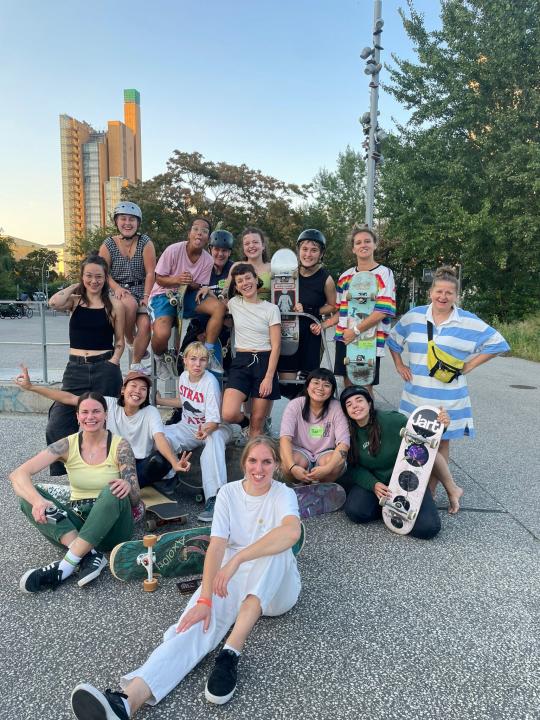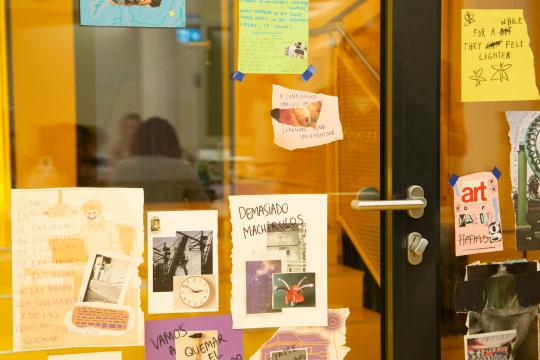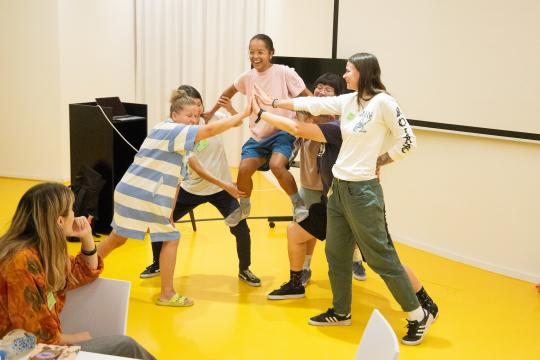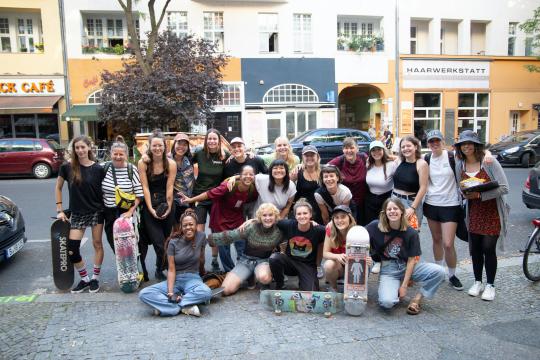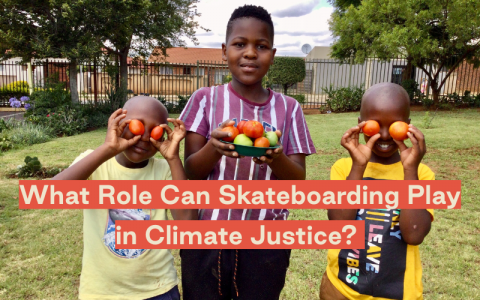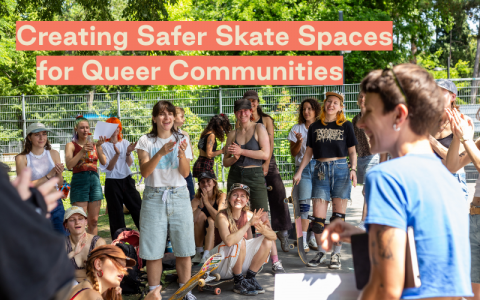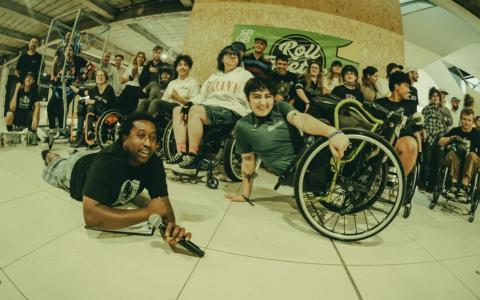This past September, 18 women and gender-diverse skaters from across Europe came together in Berlin to develop their skate programs, build connections and share their stories. The Leadership Camp is a central part of the ROLL Models Program, a collaboration between Skateistan and Women Win, which aims to create a brave space for ROLL Models to convene, acquire new knowledge and boost their confidence.
Finalizing Programme Design: Skate Lesson Planning, Measuring Impact, and Ensuring Accessibility
Each day of the Leadership Camp was curated with a specific theme in mind. The mornings were dedicated to fostering learning and meaningful dialogue, while the afternoons were designed to provide space for creative activities and group connection. Day one was focused on finalizing programme design, addressing skate lesson planning, measuring impact, and to give an introduction to accessible programs. After getting to know each other and discussing our expectations for the camp, we kicked off with a practical session on skate games and skate lesson design.
The ROLL Models shared their warm up and skate games ideas that they already run within their sessions whilst we discussed the different ways that skate games can be beneficial for skate programs — such as building ‘skate’ and ‘non-skate’ skills, how they can be inclusive for any level of skater, and to encourage a fun and energizing learning environment.
Moving onto skate lesson design, we opened the floor to hear how the ROLL Models structure their skate programs. How can following a particular routine help to run smooth and effective programs? The ROLL Models shared that structure is especially important for beginner skaters, to participate safely and to have guidance on how to progress step by step. It also helps to engage beginner, intermediate and advanced skaters all within the same session. Playing some joint games and then splitting to focus on specific skills.
We wrapped up the workshop by asking the ROLL Models to design a lesson plan responding to various scenarios focused on the inclusion of marginalized groups. A common thread throughout these sessions on inclusion was the importance of asking consent when it comes to offering support to people from marginalized communities. For example, offering to help someone in a wheelchair if they would like a push to get to the top of a ramp, rather than assuming that you are welcome to do so.
In the afternoon, our MEL virtuoso, Mbali Mthethwa, hosted the Monitoring, Evaluation and Learning workshop. Introducing the importance of measuring (and learning) from the impact of our projects — she shared the key components of an MEL plan, with practical examples from Skateistan, Free Movement Skateboarding and Women Win. Tying this into the ROLL Models’ individual projects, we asked them to think about their objectives – what problem are they trying to solve through their programs? Are they already taking steps to solve it and if so, how are they documenting these steps?
Inclusivity in Skate: Building Inclusive Skate Programs
Rounding off the first day, we began to focus on accessibility and inclusion as a segue into the theme of the second day of the camp. We gave a general introduction to accessible skate programs, highlighting that accessibility is the step that should come before considering the more in-depth elements of inclusion. I.e. optimizing access in the design process at a new space or making adaptations to an existing space to allow everyone to enter. This could be physical aspects like wheelchair ramps, but also loud music, flickering lights etc.
On day two, the workshops focused on developing inclusive skate programmes, with a focus on engaging LGBTQIA+/FLINTA* (FLINTA* is the German abbreviation for women, lesbians, intersex, non-binary, trans and agender) individuals and anti-racism in skateboarding. The day ended with a creative zine making session with the focus topic ‘what skateboarding means to me’. All workshops were co-designed and and led by members of the ROLL Models Advisory Board, so that ROLL Models from previous cohorts can share their knowledge and learning points holistically with the group.
Leadership and Wellbeing: Looking Out For Ourselves and Others
The third day of the Leadership Camp focused more closely on the theme that underpins all of the ROLL Models activities. The ROLL Models were supported to reflect on their leadership journey — identifying key moments in their leadership development, the lessons and skills learned along the way, and their goals for the future. Imogen Thrussell, from the ROLL Models Advisory Board, led a session on approaches to building resilience and wellbeing for participants, team members, and yourself. It focused on base knowledge around resilience and wellbeing, practical tools, and group reflection. In the afternoon, Rachael Sherlock (Keep Rolling Co.) and Lucia Cortes (Skatesencia) led a creative workshop to inspire the ROLL Models to start thinking about (and designing!) public skate spaces.
Alongside discussions of how to design skate spaces which are accessible for people with disabilities and for neurodivergent people, many people noted that even the most basic facilities such as toilets and access to water are rarely included in the thought process of designing a skatepark. It may seem like an insignificant element, but for many people it could be the deal breaker of whether they feel comfortable and safe being in the space. Following the session, the ROLL Models joined the Skatesencia FLINTA* session for a skate takeover!
Sharing Your Story
The final two days of the camp focused on ‘using your voice’ and sharing your story. The ROLL Models were taken through a storytelling workshop in which they were guided to create a 2-4 min personal story to capture a part of their journey within skateboarding and leadership. On the last day we hosted an intimate open mic style storytelling event, where the ROLL Models had the chance to share their stories in front of the group if they wished to. They were encouraged to use their voice and platform to address the challenges they see and face in the skate community, and through doing so, to see the impact their story could make in the lives of young people.
Thank you so much to everyone who attended and shared their ideas, experiences and hearts throughout the five days. We were reminded of just how important it is to come together in person to share and exchange. Onwards and upwards!
A big thank you to Lucia Cortes for all of your support (and taking the beautiful photos!), the ROLL Models Advisory Board for co-creating the program and facilitating engaging workshops and everything else in between. Last but not least, a huge thank you to Women Win for continuing this wonderful collaboration with us.
